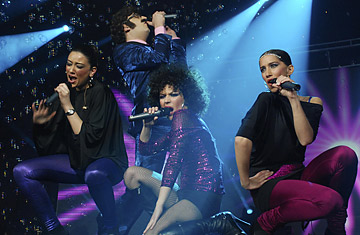
The Georgians' entry "We Don't Wanna Put In" by Stephane and 3G won by a large majority in Georgia, but was banned by Eurovision's multinational panel of judges this week due to its overt political content.
Hundreds of thousands of Russians were glued to their television sets last Saturday for an event that they treat with almost as much gravity as an international sporting match or a presidential address. It was the finals to choose Russia's contestant in the Eurovision contest.
Eurovision, which most famously gave the world ABBA, is a much-anticipated annual pop music competition with contestants representing countries from Iceland to Turkey, from Morocco to Israel. No one takes the contest more seriously than the Russians. Last year, for example, they sneered when Ireland's representative in the Eurovision finals was a hand puppet named Dustin the Turkey. Russia's own contestant was Dima Bilan, a star so established that a BBC commentator sniped that it was as if Britain had sent Amy Winehouse to the competition (well, if she was allowed to travel). Bilan, who has a hugely successful Timbaland-produced album, performed in an elaborate presentation that featured Olympic-champion figure skater Yevgeny Plyuschenko skating next to him. Bilan won the finals and afterward was congratulated by both Russian Prime Minister Vladimir Putin and Russian President Dmitri Medvedev. (See a pictorial tribute to the spectacular cheesiness of Eurovision.)
Nationalism plays a growing part in the competition. Viewers from across Europe are allowed to phone or text in their rankings of the contestants, with the proviso that a country's voters cannot vote for their own country's representative. Yet this has led controversial bloc voting in an effort to prevent others from winning. Says Alexander Panaiotov, a Russian pop star: "It's the biggest musical event of the year. Of course it's politicized." A case in point, he says, is Russia and Ukraine. "Russia doesn't care if, say, Bosnia wins, but if Ukraine wins, it's a scandal." Ukraine and Russia have been scrapping ferociously over gas and oil for two winters in a row. (In a slight rule change, Eurovision is re-introducing a pool of judges to try to ameliorate any unfairness that may arise from the popular vote.)
As the 2008 winner, Russia gets to host this year's finale and preparations are already underway in Moscow for the big show in May. The walkup to the competiton already has spawned several controversies for organizers and politicians to deal with. Russia's large contingent of gay Eurovision fans is feuding with Yuri Luzhkov, Moscow's notoriously homophobic mayor. Russian gay rights groups are threatening to schedule a parade during the contest, despite being warned not to by Luzhkov. If the march does take place, it will most likely be met with violence and arrests, which have taken place every time a gay rights march is held in Russia.
The next controversy involved Georgia, which was the recipient of Russian troops last year. The Georgians' entry, "We Don't Wanna Put In" by Stephane and 3G, reflected the country's sentiments about the war, with a not-so subtle reference to Putin. The song won by a large majority in Georgia, but was banned by Eurovision's multinational panel of judges this week for violating the contest's prohibition of songs with overtly political content.
And then there's the sticky case of Russia's entrant this year. The winner in the national finals was Anastasia Prikhodko with her song "Mamo," sung in a combination of Ukrainian and Russian. Some of the lyrics were written by an Estonian, the music was written by a Georgian and the song is performed by Prikhodko, who is Ukrainian. This combination horrifies Russian patriots, as Russia has had major political conflicts with Georgia, Estonia and Ukraine in the last two years. Prikhodko's producer Konstantin Meladze insists, however, that her song should inspire friendship between the four countries.
But Prikhodko brings more baggage with her. She was the winner of Star Factory, Russia's version of American Idol; and, in 2007, she was filmed on the show telling another contestant that she doesn't like Chinese people or blacks. She apologized about this shortly after the incident. Then the Moscow tabloid Moskovsky Komsomolets charged her with being a Hitler supporter, printing pictures of her brother Nazar wearing an arm band with what appears to be a Swastika. Nazar has denied it was the notorious Nazi sign, saying it was a patriotic symbol; he has threatned legal action against the tabloid.
Prikhodo is also taking potshots from Panaiotov, who holds a Ukrainian passport and tried out for both the Russian and Ukrainian Eurovision spots (he came in second in Ukraine and was disqualified from the Russian contest for "not being patriotic enough"). "The fact that she won is a farce," he says. "I have nothing against her personally, but her performance is nothing to applaud." He says he won't be cheering for either Ukraine or Russia. "I will be voting for Norway. Their entrant, Alexander Rybak, is phenomenal. If talent matters at all in this contest, then he will definitely win."
